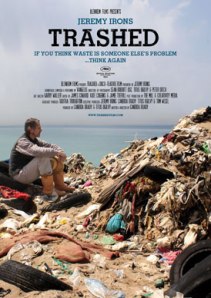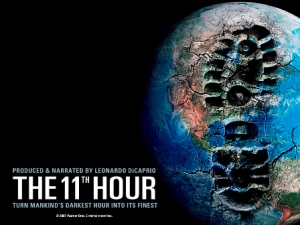Movies to the Rescue! Can the Entertainment Industry Save the Planet?
November 21, 2012 § Leave a comment
I consider myself to be the average movie-goer. Every once in a while, I’m happy to indulge in eight dollar’s worth of a big-screen, a comfy chair and an entertaining story. But you know what I’ve sadly come to realize? I never watch the right movies. I’ll admit it: I’m a sucker for guilty pleasures. Give me a good romantic comedy, even a respectable drama, and I’ll be happy. Horror movies are on reserve for Halloween, and animated features are among the perks of a babysitting gig. But the one genre I almost never watch is the documentary, and this, I think, is an unfortunate circumstance of our entertainment-obsessed society. There is so much we could learn from documentaries, and as someone who cares about the environment, I’ve seen multiple trailers for eco-documentaries that seem genuinely interesting, informative and important. But even I, someone who is passionate about protecting the planet, never spend those eight dollars on an informative documentary if I could be watching a comedy instead. What does this say about the documentary genre? Are they really effective at spreading their message to a wide audience?
My point here is not to denounce documentaries. In fact, I think they are immensely ambitious and important films. They are created, from the start, with a deliberate motivation to raise awareness and incite a reaction. But they don’t have the cheap thrills that entertainment blockbusters do, and this is where they lose out. Since 2008, more than 20 environmentally related documentaries have been released. Many received positive reviews but the public was largely unaware of most of them anyway. This is a shame! And yet, you have to admit: it’s hard to market a movie that seeks not to distract us from our lives but rather to draw attention to actual problems on this planet. We need a positive incentive to watch a movie, and most of the time, learning about an important issue is not enough. Documentaries need something more.
 ‘Trashed,’ a documentary released this past spring, found that ‘something more:’ namely, Jeremy Irons. The high-profile actor not only helped produce the film but was actually featured on screen, exploring society’s profligate waste and tracking down our trash, including those mile-long floating islands of plastic on the Pacific. But while Irons’ presence certainly helped draw attention to the movie, it still didn’t spark a national conversation.
‘Trashed,’ a documentary released this past spring, found that ‘something more:’ namely, Jeremy Irons. The high-profile actor not only helped produce the film but was actually featured on screen, exploring society’s profligate waste and tracking down our trash, including those mile-long floating islands of plastic on the Pacific. But while Irons’ presence certainly helped draw attention to the movie, it still didn’t spark a national conversation.
Another example of a documentary using a big name to attract an audience is the 2007 film, ‘The 11th Hour.’ Leonardo DiCaprio created, produced and narrated the film, which received favorable reviews but barely opened on more than 100 screens nationwide. But wait, I know I’m leaving out the one film you’re probably thinking about right now: Al Gore’s ‘An Inconvenient Truth,’ directed by Davis Guggenheim. Yes, this film was undeniably a box-office success and sparked a national conversation about climate change and the need for environmental action. Still shown in classrooms today, this movie made believers out of many people, myself included.
I was 15 when I saw it in my town’s local theatre, and I still remember walking home afterwards with feelings of anger and frustration. That night, I sat down at my computer to compile a list of ways to reduce our individual impacts on the earth. I wrote what I considered at the time to be a comprehensive and persuasive email (I’d like to see it now), encouraging that we turn our lights off, unplug appliances and generally be mindful of our energy use, and then sent the email off to my friends and family. For a 15 year old, that was the most action I was ready to take. But now, six years later, I’m still passionate about the environment and eager to create change, and this I attribute largely to Al Gore and his film.
So yes, some documentaries can inspire change and encourage action from people who were previously unaware of the issue at stake. But I think it’s legitimate to argue that, for the most part, documentaries preach to a choir of like-minded people. This isn’t to say that everyone watching Irons’ “Trashed,” for example, is already informed about the issue, but rather that everyone who devotes two hours of their day to watching the movie is predisposed to hearing the information and to being persuaded that there is, indeed, a problem.
So how do we make these films more appealing? How do we get people from all walks of life and all ends of the environmental spectrum (from activist to denier to clueless) to pay attention? A celebrity appearance isn’t always enough. We need to take a more creative and inventive approach to representations of the environment in the media. Let’s make a blockbuster out of an environmental story! Sounds great, right? But it’s easier said than done.
There are some examples of movies that have achieved this goal. ‘Wall-E,’ for example, shows a futuristic world where the entire planet is covered in waste. ‘Avatar’ has also been said by some to carry an underlying environmental message in the way it represents the destruction of biodiversity. And what about ‘The Lorax,’ or ‘The Day After Tomorrow?’ None of these films ended with an explicit and direct warning about the dangers of climate change (except perhaps ‘The Lorax’), and yet the underlying message is still there and inevitably leaves an imprint on viewers. Can we, thus, embed environmental messages into movies and hope that they will have some impact?
I think so. I believe that if we manage to produce more movies that provide quality entertainment while also hinting at environmental messages, we can create a society where people are aware about these issues, familiar with their implications and, when they are brought up in national conversation, can understand what’s at stake. If from childhood we watch movies telling us that this planet should be respected, that we shouldn’t cut down forests or throw our trash into the oceans, then we will not have such a large debate when real action on these issues is proposed. Perhaps this is too idealistic, but I don’t think it hurts to try. If we can hybridize our environmental agenda with blockbuster thrills, we can make entertainment out of fact and encourage action from enjoyment. And then, think of how much money we’ll save: eight dollars not just for a cheap thrill, but for a documentary in disguise as well!
Who Will Help the Environment?
November 14, 2012 § 1 Comment
With the reelection of Barack Obama as US President now exactly one week behind us, many environmentalists have been asking whether he will be more active and decisive on environmental issues. It’s debatable the extent to which Obama promoted green initiatives in his first four years, and environmentalists are hoping to see an increase in environmental stewardship in the next four. All across the blogosphere, people have been debating whether Obama truly plans to help the planet, whether he even can, and what might happen if he doesn’t.
I definitely can’t give you a better answer than the experts, but I will say that I have hope. The past couple months have seen a nationwide drought, wildfires in Colorado, and, most recently, Hurricane Sandy that wrought unprecedented destruction on the east coast. I think people are coming, perhaps slowly, to a recognition that climate change is a force to be reckoned with. Whether or not this realization will last long enough to allow for collective action is hard to tell. A similar interest was roused after Hurricane Katrina in 2005, but we barely talk about that storm’s causes or consequences anymore.
Nonetheless, I hold out hope. I’ve seen my generation of young leaders with their impressive awareness of climate issues and it gives me a spark of inspiration that we can, in the future, face this problem more cooperatively than has been the case so far. Most of us took some version of Environment 101 in college, and some were even being taught these principles from childhood, either by their school or informed parents. I’m part of a group on campus that visits local elementary schools to teach kids about different kinds of energy and why conservation is important. And after every visit, whether it be in Princeton or Trenton, I’m gladdened to see that most of these youngsters are aware of what energy is, how we can save it, and that it’s an important thing to do.
So even if President Obama can’t solve all our environmental problems in the next four years (as no president could), at least I know we have a generation of people growing up and ready to take control of this country that understands the importance of the environment and the need for change. This isn’t to say that I expect nothing from Obama: in fact, I’m hoping he starts soon enough by blocking Keystone XL. But I’m also saying we have to rely on ourselves as a collective to ask for and enact change, and this, I believe, will become increasingly possible in the years to come, thanks to better environmental education on the part of the generation above us. Those previous generations might not all be onboard with an agenda to fight climate change, but they at least managed to reach out to us younger kids, who will be ready and able to take over and fight the good fight.



